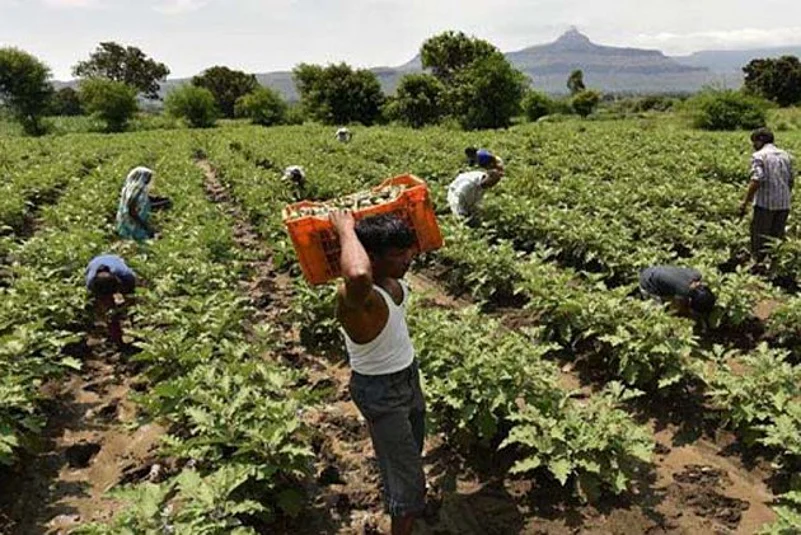For Manish More, a farmer from Otur village in Pune, the Covid-19 crisis turned into an opportunity to think about innovative delivery mechanisms to sell his vegetable crop in nearby cities. Like More, many farmers who used to sell their produce to local markets or through middlemen before the coronavirus pandemic, suddenly learnt how market frontiers had blurred, pushing their produce beyond geographical boundaries.
The dispatch of More’s first order of 60 boxes on April 9 involved use of three entrepreneurial business strategies. First, farmers came together to form a WhatsApp group to discuss scarcity of perishable commodities in nearby potential cities. Second, the group of farmers was registered as a farmers’ producer company under the Companies Act. Consequently, as the group swelled further and more varieties of vegetables and fruits were added to the list of commodities for sale. And finally, a brand titled 'Kisan Konnect' was developed and supplemented with a website where orders were placed and executed. As a result of these measures and with completion of more than 80,000 deliveries, these farmers did business to the tune of Rs. 2.75 crore.
Advertisement
Unleashing of such agribusiness entrepreneurial spirit is at the core of Prime Minister Narendra Modi’s recent clarion call for Atmanirbhar Bharat. In fact, the Doubling Farmers Income (DFI) Report, 2017, highlights providing extensive funding opportunities for agri driver-entrepreneurs, farmers' aggregation into collectives and support to agri startups that directly purchase from farmers. The DFI Report says the key objective is to enable physical access of farmers’ produce to markets to monetise it in larger volumes and enable realisation of remunerative incomes.
Experts opine that to make the above objectives a reality, a sustained source of funding for agribusiness entrepreneurs is extremely critical. This, they say, will provide the necessary push to leverage new age technologies in agriculture such as Internet of Things (IoT), artificial intelligence, etc. to make supply and value chain management more transparent. It will also provide necessary impetus to plug bottlenecks in agricultural infrastructure.
Advertisement
In the above context, the setting up of Rs. one lakh-crore Agricultural Infrastructure Fund (AIF) by the Ministry of Agriculture & Farmers Welfare is a step in the right direction. It aims at mobilising investment, through both incentives and financial support, in viable projects relating to post harvest management and community farming assets. The fund has two innovative features. First, its focus on creation of farm-gate infrastructure with appropriate technology such as village warehouses, packhouses and cold chains that will enable farmers to sell directly to bulk buyers, processors and consumers. Second, provision of interest subvention and credit guarantee. Ultimately, through the aegis of this fund one is looking at is the creation of a robust ecosystem wherein initiatives of agri entrepreneurs will in turn empower farmers, especially small and marginal farmers.
But experts also opine that small and marginal farmers are unable to reap the benefits of accessing agricultural markets due to absence of economies of scale and lack of timely information. Farmer Producer Organisations (FPOs), they highlight, are an apt institutional form of aggregating such farmers. Farmer members, herein, are able to leverage their collective strength and bargaining power to access financial inputs leading to reduction of transaction costs. At the same time, they can tap high value markets and enter business partnerships with other entities on equitable terms.
Such constraints have been addressed by the launch of a dedicated central sector scheme for formation and promotion of 10,000 FPOs across the country. It provides handholding and support to FPOs up to five years. The scheme has four distinctive features. First, it makes a ‘produce cluster area’ an essential for FPO formation that includes organic and natural farming (making it possible to achieve synergies with the ‘One District One Product’ approach for development of agri product specialisation). Second, setting up special purpose cluster based business organisations. Such entities will assist the implementation agency in entry point activities, farmer mobilisation, conduct of baseline surveys and most importantly in preparation of core business plans. Third, financial assistance will also be available to value chain processing and export entities that are supporting FPOs through cluster approaches. And last but not the least, availability of equity grants and credit guarantee cover for accelerated flow of institutional credit to FPOs.
Advertisement
Along with the above initiatives of the government, the country has also seen the successful emergence of agri-tech businesses and within its ecology entrepreneurs who are focusing on reengineering the fragmented supply chain of perishable horticulture commodities. ‘Ninjacart’ is one amongst more than 450 agri startups that aggressively use technology to introduce supply chain efficiencies. ‘Ninjacart’ buys farm produce from more than 4,000 farmers and sells it to retail stores across Chennai and Bangalore. In addition, it uses artificial intelligence to predict demand from the core farmer data collected enabling them to systematically trim waste. The Atal Innovation Mission with its Atal Tinkering Labs aims at strengthening and promoting such agribusiness entrepreneurship initiatives in the country.
Advertisement
Without an iota of doubt, the framework of implementation for agribusiness initiatives with the cooperation of state and local governments has to be holistic. It will, perhaps, make sense to first select key origin-destination ‘corridors’ of perishable horticulture commodities. Thereafter, these ‘corridors’ need to be mapped in terms of gaps in input/output market linkages, e.g. community assets, micro storage, FPO/Startup strengthening, rail/road/air links, domestic/export potential, investment needs and most importantly capacity building of small and marginal farmers through Krishi Vigyan Kendras (KVKs).
Such a converged approach will provide more farmers with more robust ecology to be entrepreneurial and innovative. More so, in context of the nationwide promulgation of two historic ordinances for farmers on barrier free trade in agricultural produce and to engage with sponsors of their choice.
Advertisement
(The writer is Additional Secretary, Ministry of Agriculture & Farmers Welfare, Government of India. Views expressed are personal.)




















